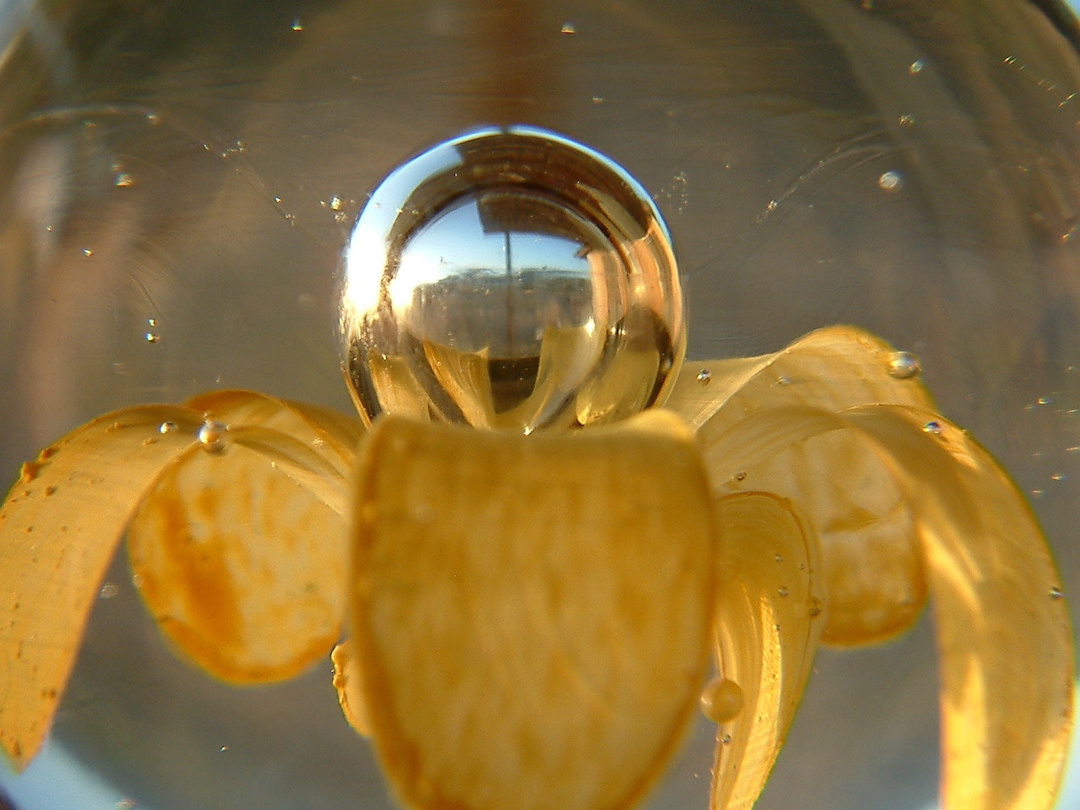Weight of a Thousand Flowers by Linda Petrucelli

“I can see myself living here for a very long time,” I told the realtor, my fingers trembling as I signed for the rundown rancher with a great view.
I surprised myself. Long-term commitment was unlike me.
Just as I turned fifty, a psychic alarm must have sounded because, after years of nomadic wandering, I suddenly longed to settle down and affix myself to one place.
With the dismantling of my childhood home, I began to think how thoroughly I had bought into the notion of progress measured in terms of movement—great leaps forward and paradigm shifts. I had chased a lot of jobs in an effort to advance, only to take flight just when stability was required to progress to the next level. Even a prestigious title and corner office couldn’t contain my roving eye. Months after landing what I thought was my dream job, I was at it again—checking the listings for new positions. There was always another ladder, another stepping stone.
But having roots, holding one’s ground, can mark a kind of achievement, too. The word for it is lastingness.
+++
A glass paperweight came into my possession about the time I bought the rancher. Stable in disruptive currents, a paperweight’s supreme goal is to hold things down. A decorative anchor, essentially. Pietro Bigaglia, the scion of a fabled Venetian glass dynasty, is credited with inventing the first paperweight. It was Bigaglia’s deceptively simple conceptual leap—flatten the bottom—that turned a colorful sphere into a stable object that didn’t roll away.
My father had died, and in that forlorn state of orphanhood, my sister and I were readying the old house on Ridgewood to be sold. I stood alone in the living room, trying to tamp down an irrational desire to flee. That’s when I spotted it. My mother’s glass paperweight— filmed with dust, still occupying the same, familiar place on the roll-top desk. She had died decades before, but the weight seemed to bring her to life.
+++
Picking up the glass globe, heavy as a cannonball, I admired the countless crystal florets sealed inside what appeared to be a drop of rain. Since the Renaissance, glassworkers have practiced a technique called millefiori—Italian for a thousand flowers. Rods of colored glass are fused in a furnace, pulled like taffy, and then sliced—each segment revealing a kaleidoscopic cross-section of serrated stars.
Millefiori was applied to the surface of glass balls and became a significant export of 14th century Venice. After Bigaglia, artisans improvised intricate floral designs by sealing a mosaic of the glass rods inside a matrix of crystal.
The heaviness of my mother’s paperweight, its actual heft, once would have put me off. The burden of weighty things gets in the way of an unsettled life. Without telling my sister, I taped it in bubble wrap and then nestled it among the wrinkled clothes in my carry-on.
Mother never lovingly passed the paperweight down to me. She didn’t tape a note on its flat bottom—this should go to—and then scrawl my initials in her peculiar left-leaning script. It’s something of hers that I chose. Not quite stole, but seized for myself.
+++
More than likely, she found it in the Salvation Army Thrift Store over in the west end where, elated, she’d lumber down the crumbling steps to the basement of an abandoned warehouse.
Her eagle eye would have spotted it immediately, perched on a shelf crammed with cheap gewgaws, shimmering even in the shadows. Exquisite, she would think, picking it up and feeling its astonishing heaviness. The old-world feel would appeal to her—that Victorian fascination with lavender sealing wax and letter-writing that the paperweight evoked.
She wouldn’t have minded when her index finger felt the two fleabite dings in its crystal dome. Wasn’t the Venus de Milo revered even though her arms were missing?
+++
I didn’t mind that none of the doors of my new house closed properly and half the windows had been painted shut. Its low-ceilinged rooms felt cozy though and not oppressive as I had feared. The house was a long way from being perfect, but the view outside my study’s window—a meadowed grassland—lent a focal point to rest the eyes and helped me sit in stillness.
+++
The paperweight felt cold to the touch as I placed it on my flea market desk under a garage sale ceramic lamp. It captured the light, and inside its magnifying dome, a glorious garden of coral rosettes and teal petals bloomed on the wooden desk top.
It was difficult to pinpoint the paperweight’s mysterious power. Its interior, ever vivid, ever bright, was frozen in a kind of eternity. But when I held it in my palm, the changing magnification of the glass dome made it come alive. As I rotated the weight, the flowers shifted as if in a breeze.
Outside, the wind rustled the peeling eucalyptus trees and charged through the window. I slipped a sheaf of papers, my mortgage application, under my mother’s weight and watched the sheets flutter but not flee.
 Linda Petrucelli is a writer obsessed with short-form prose. Her latest essays appear in Sky Island Journal, Pollux, Barren, and Gulf Stream Literary Magazine—forthcoming in Parhelion. Linda lives on the Big Island of Hawai’i, where she writes and shares a lanai with one husband and ten cats. lindapetrucelli.com
Linda Petrucelli is a writer obsessed with short-form prose. Her latest essays appear in Sky Island Journal, Pollux, Barren, and Gulf Stream Literary Magazine—forthcoming in Parhelion. Linda lives on the Big Island of Hawai’i, where she writes and shares a lanai with one husband and ten cats. lindapetrucelli.com
